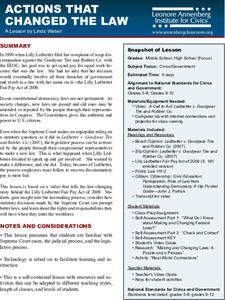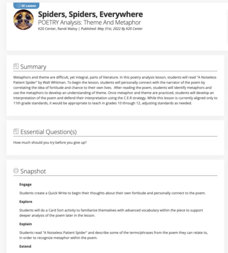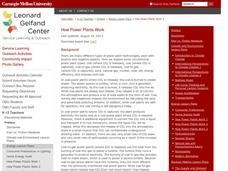Teach Engineering
Balancing Liquid on a Coin: How Intermolecular Forces Work
Let knowledge of chemistry flow like water. Future scientists conduct two different experiments to investigate the properties of water. They learn about surface tension and cohesion as they see how many drops of water they can place on a...
Teach Engineering
Java Code: Does It Work? Test and Test Again
Testing software code can sure test one's patience. Future programmers learn about the importance of testing when writing code for computer software. They access the CodingBat website to test programs written in Java using three test...
Anti-Defamation League
Is Olympic Coverage Sexist?
Women Olympians have come a long way since 1900 when 22 women competed for the first time. News coverage of the Olympics has also changed dramatically. What has been slow to change, however, is the language used in the coverage of female...
Learning for Justice
Mary Church Terrell
Excerpts from an 1898 speech by civil rights activist Mary Church Terrell offers young scholars an opportunity to investigate how Black American women fought for civil rights long before Rosa Parks and the civil rights movement of the...
Anti-Defamation League
Women's Suffrage, Racism, and Intersectionality
The Nineteenth Amendment granted women the right to vote—as long as they were white. High schoolers read articles and essays about racism in the suffrage movement and consider how intersectionality played a role in the movement. Scholars...
Smithsonian Institution
The Suffragist: Educator's Guide for Classroom Video
Class members take on the role of historical investigators to determine why it took 40 years for women in the United States to get the right to vote. Sleuths view videos and analyze primary sources and images to gather evidence to answer...
Annenberg Foundation
Actions that Changed the Law
The Fair Play Act of 2009 came about due to the actions of one woman. Young historians research Lilly Ledbetter and what she went through to get pay equal to that paid to men for the same work at Goodyear Tire and Rubber Company. The...
Anti-Defamation League
Harriet Tubman on the $20 Bill: The Power of Symbols
How important are symbols and symbolic gestures in society? Middle schoolers have an opportunity to analyze the importance of symbols on American currency with a lesson that investigates the controversies surrounding redesigning the $5,...
Trinity University
Introduction to Poetry
Introduce fourth graders to poetry with a three-week unit that has them examine the structural elements of poetry, analyze poems, and craft their own original poems rich in sensory details and other poetic devices. Young scholars study...
Texas Education Agency (TEA)
Maintaining Your Health and Well-Being
Future counselors and mental health professionals engage in two activities that give them insight into careers in human services. First, groups of four compare and contrast health and wellness apps and share their findings with the...
Overcoming Obstacles
Communicating Constructively
Some conversations are easy and enjoyable, while others are horrific! To begin a lesson on communicating constructively, class members list examples of conversations that are easy, average, and those that are difficult and identify what...
Anti-Defamation League
Stereotypes of Girls and Women in the Media
A two-part lesson has scholars researching the stereotypes in portraying women and girls in the media and the impact of these representations. To conclude the lesson, participants write a letter of praise to sources that present positive...
Anti-Defamation League
"What is it Like to be an Outsider?”: Building Empathy for the Experiences of Immigrants
This lesson highlights the struggles of immigrants and the importance of showing empathy. Beginning with a read-aloud of a book in another language and a poem, scholars take part in a thoughtful discussion. Then, the class examines a...
Anti-Defamation League
Who Was César Chávez?
Scholars complete a KWL chart to indicate what they know about Cesar Chavez and then research what they want to know about this farm worker, labor leader, and civil rights activist. To complete the lesson, scholars research modern civil...
Core Knowledge Foundation
Colonial Towns and Townspeople Tell It Again!™ Read-Aloud Anthology
A read-aloud anthology focuses on colonial towns and townspeople. Over three weeks, young scholars listen to stories, participate in discussions about town life, practice word work, and complete an extension activity with each lesson.
K20 LEARN
Spiders, Spiders, Everywhere: Poetry Analysis - Theme And Metaphor
Walt Whitman's poem "A Noiseless Patient Spider" provides high schoolers an opportunity to reflect on the importance of perseverance and fortitude. After drafting a Quick Write about a time they tried and tried again to accomplish...
Curated OER
Abigail’s Daily Life
Young scholars continue their analysis of Abigail Adam's letters looking in this lesson plan at what they reveal about her daily life and concerns about the increasing political tensions with the British.
Curated OER
Abigail and Her Sisters
The 10th lesson in this series has researchers examining a packet of letters from Abigail Adams to her sisters. Scholars note examples of the themes that appear throughout the letters.
Curated OER
Identifying Linear Functions from Graphs
Keep your mathematicians engaged using this group linear functions activity. Each of ten groups receives two graphs with both an image and equation, as well as a "who has" phrase to call out the next graph. Scholars stay on their toes as...
Curated OER
Using Context Clues
Middle schoolers receive a handout that lists the five types of context clues. The class divides up into groups of three or four, and each group chooses five unfamiliar words. They write a multiple-choice question for each of their five...
Teach Engineering
Not So Simple
Compound machines, nothing more than a combination of simple machines working together, are the focus of an activity that asks class members to use the provided information to take a look at the way innovators combine simple machines to...
Curated OER
The Progressive Era: Muckrakers Grade 8
As you explore an excerpt from Upton Sinclair's The Jungle with your class, discuss how his descriptions of the meat-packing industry caught the public's attention and helped to promote change in the Progressive Era.
Carnegie Mellon University
How Power Plants Work 3
Double, double toil and trouble, fire burn and cauldron bubble! Find out what drives a turbine to generate electricity and whether or not it has an impact on the environment. A discussion and lecture is divided by a hands-on activity in...
National Gallery of Canada
My Scene
Acquaint your class with line, color, shape, and texture through a study of artwork and an art activity. The resource includes images and information to share with your class before sending individuals off to sketch and paint landscapes...
Other popular searches
- Vocabulary Games
- Vocabulary Exercises
- Vocabulary Words
- French Vocabulary
- Vocabulary Building
- Vocabulary Graphic Organizer
- Vocabulary Development
- Math Vocabulary
- Fashion Vocabulary
- Descriptive Vocabulary
- Science Vocabulary
- Vocabulary Acquisition

























